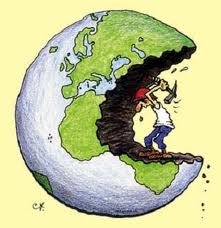Can the World Move Beyond “Infinite-Planet Thinking?”
Mar 17th, 2015 | By admin | Category: Economics and GDP, FeaturedBy Suzanne York.
“Can the world get richer forever?” asks a recent article in the BBC News.
If you ask a politician, mainstream economist or the 1%, the answer is likely to be “yes.” As noted in the BBC piece, growth “is almost universally seen as a Good Thing.” If you ask most environmentalists, scientists and youth, you’re more likely to get a “no” because most would acknowledge, as does the BBC correspondent, that “We live on a finite planet, but growth is exponential.”
The question of whether or not the world can continue to become financially richer is predicated on the idea of constant economic growth. This is what writer Eric Zencey terms “infinite-planet thinking.” Zencey has written that this is embedded deeply in our political economy. “It’s there in the unquestioned consensus among elected officials that economic growth is always good – that it can’t possibly ever be uneconomic growth, costing us more in lost natural and social capital than we gain from additional consumption.”Zencey stated that this presumption that the planet is infinite is killing us, literally.
Case in Point: Global Free Trade
The G20 (Group of Twenty major economies) unsurprisingly promotes economic growth as its main agenda. According to Foundation Earth, a U.S.-based think tank, the G20 “aims to increase infrastructure spending to stimulate a sluggish global economy. Their stated goal is the mobilization of as much as $60-70 trillion dollars of investments in mega projects over the next 15 years.” The Economist called this “the biggest investment boom in history.”
Concern that the planet cannot handle any more mega projects (such as China’s Three Gorges Dam), Foundation Earth has drafted a letter to the G20 leadership, signed by farmers, scientists, authors, philanthropists, Indigenous leaders, and other leading thinkers. The letter offers “suggestions on changing the economic model,” and points “to new scientific findings on the kind of infrastructure that would support a new ecologically minded economic model.”
Briefly, fundamental change to the current economic model includes the following three points:
- Carrying Capacity Analysis & Protection: The economy needs institutions with the power to ratchet down or shift economic activity when carrying capacity limits are being approached. Mandatory disclosure of ecological impacts that are third party certified and show how they affect the nine planetary boundaries would advance this goal.
- A True Cost Economy: Use techniques, not limited to full cost accounting, to expose ecological impacts (externalities). Implementing the existing IMF and G20 commitments to eliminate ecologically perverse subsidies to oil and gas is further enabled when there is a big drop in energy prices. Projects that further exceed the already overstressed Planetary Boundary system should not be funded with public or private money.
- Continental/Regional Self-Reliance: Self-reliance in basic needs (food/clothing/shelter) and comfort items should be maximized at the continental and sub-region level. A model of continental networks of regional economies that produce most of what people need. This model fosters resilience and local jobs for local markets.
Stop Enabling Business as Usual
Today, humanity consumes one-and-a-half planets’ worth of resources, and this day of global overshoot arrives earlier with every year. World population growth is still increasing, and with it, levels of unsustainable consumption.
Rethinking new economic models that support the health and rights of people and the planet is sorely needed. In 1987, the World Commission on Environment and Development put forth a definition of sustainability, in which a sustainable society is one that “meets the needs of the present without compromising the ability of future generations to meet their own needs.” This should be guiding the G20, politicians and many others, to enable them to support creating a new economic narrative.
Last year, at The Economics of Sustainability Conference in San Francisco, Randy Hayes, Foundation Earth founder and director, told attendees that “the most important environmental policy is an economic policy” and that “free markets are not free from ecological limits.” Perhaps once this is understood, will we actually stand a chance of overcoming infinite-planet thinking.


